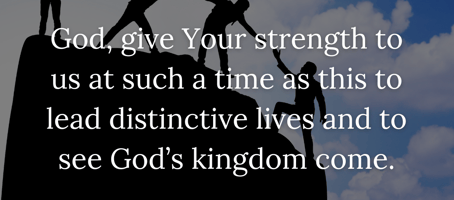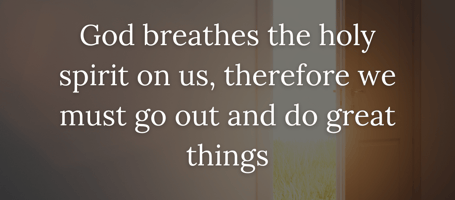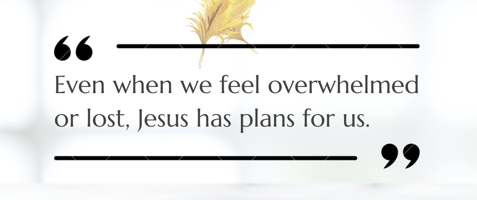This blog is based on a sermon by Pastor Teresa Howell-Smith on May 11, 2025 We all reach those...
Where Does Your Treasure Lie?

This blog is based on a sermon by Pastor Teresa Howell-Smith on January 26, 2025
I recently came across a graphic online that illustrated two people at a table with a stack of cookies. Surprisingly, 90% of the cookies were owned by just 5% of the people. The remaining cookies were divided amongst the upper middle class, the middle class, the working class and the poor. The 5% who control 90% stirred up conflict, making the 10% compete against one another by driving them to blame one another.
This scenario paints a picture of division much like the “crabs in a pot” analogy: Crabs in a boiling pot will pull each other back down when one crab attempts to escape. Meanwhile, no one questions why a mere 5% owns 90% of the “cookies.”
In the final years of his life, Dr. Martin Luther King Jr. turned his focus to the issue of poverty, recognizing the contradiction that in the richest country in the world, there was a growing abandonment in the midst of abundance. He came to understand the relationship between militarism, racism and poverty. In the time before his death, he began to organize around the poor people’s campaign. There is a quote by King that goes like this:
“The movement must address itself to the question of restructuring the whole of American society. There are 40 million poor people here. And one day we must ask the question, ‘Why are there 40 million poor people in America?’ When you ask that question you are raising questions about the economic system, about a broader distribution of wealth. When you ask that question, you begin to question the capitalistic economy. And I’m simply saying that more and more, we’ve got to begin to ask questions about the whole society. We are called upon to help the discouraged beggars in life’s marketplace. But one day we must come to see that an edifice, which produces beggars, needs restructuring. It means that questions must be raised. And you see, my friends, when you deal with this you begin to ask the question, ‘Who owns the oil?’ You begin to ask the question, ‘Who owns the iron ore?’ You begin to ask the question, ‘Why is it that people have to pay water bills in a world that’s two‐thirds water?’ These are the questions that must be asked.”
I don’t think Dr. Martin Luther King Jr. was the only one asking this question. When we look at Amos 8: 4-8, we see similar questioning of the systems in place. The poor were exploited for profit and the needy were mistreated with contempt. Through Amos, we hear God’s displeasure at this, and it reminds us that there should be fairness and equity in how we treat one another.
In Matthew 6:19-21, 25-34, we see that Jesus was also concerned with those same systems. Jesus was concerned about equity for all. This is why he turned over the money changers’ table – he was angry that the poor were being cheated out of their money. The system was broken. Jesus spoke about money many times throughout the scriptures – 16 of the 38 parables were concerned with how to handle money and possessions. In the Gospel, one out of every ten verses deals with the subject of money. In The Bible, Jesus offers several verses about prayer and less than 500 verses about faith, but more than 2000 verses about money and possessions.
The question that Jesus asks is, “Where does your treasure lie?” In a blog titled “The Theology of Work,” the author highlights that justice at work is everyone’s responsibility. We must ensure that everyone in society has what they need to make a living. Amos criticizes Israel about its injustices, particularly about the law of gleaning, which allowed the poor to collect the leftover grains and crops after a harvest. God’s covenant with Israel required farmers to leave part of their harvest for the poor, specifically the widows and the orphans. This rule provided a basic form of support, giving the poor an opportunity to work rather than beg or steal. Instead, Israel was violating this provision, and farmers offered to sell waste to the poor at high prices.
In the Lord’s Prayer during the Sermon on the Mount, Jesus talks about prayer and says, “Give us this day our daily bread.” This means that God provides for our needs. One writer mentions that the standard of economic focus is on gaining wealth, while God’s focus is on fairness and care for all. Right before the request for daily bread, we pray, “Your kingdom come, your will be done on earth as it is in heaven.” We can be sure of our daily bread, but in a world affected by so much greed, getting enough food is often uncertain. And although God has given us the ability to produce enough food for everyone, hunger still exists. This is why Jesus teaches us, “Give us this day our daily bread.” We look to God for what we need.
Again in the Sermon on the Mount, Jesus asks the question, “Where does your treasure lie?” Sometimes our treasures are reflections of our greed – our physical items and our possessions.
There’s a story from a few years back where some construction workers were laying down a foundation for a building outside of the city of Pompeii. They discovered the corpse of a woman who must have been fleeing from the eruption of Mount Vesuvius, but was caught in the rain of hot ashes. The woman’s hands clutched jewels which were preserved in pristine condition. She had the jewels, but death had stolen all of it. The moral of the story is that treasure is often not a wise investment because you cannot take it with you into the afterlife.
Jesus asks, “Where does your treasure lie?” He is speaking to society’s ills, and as a reader, you might be wondering how that connects to the overall message. When we look at the text of Amos, or we look at those quotes from Dr. Martin Luther King Jr., we ask ourselves, “How do we get to that place?”
Jesus wants us to think about where we put the important things in our lives. I can tell you that as a mother of a teenage daughter, going shopping can be difficult – especially with the influence of social media and ads. These material objects that she wants, like a purse that simply has a brand name on it, cost a lot of money. It's in situations like this that we need to ask ourselves, “Where does your treasure lie?”
We shouldn’t focus so much on the stuff that we wear or the cars that we drive. I remember when an old neighbor had passed and all of her belongings ended up on the side of the street. When we die, there’s a good chance that the things that we thought we treasured in life will end up simply being thrown out.
Jesus tells us not to worry because He cares for us. Welsh minister and medical doctor Martyn Lloyd-Jones once wrote:
“I do not cling to these things. They do not become the center of my life and existence; I do not live for them or dwell upon them constantly in my mind; they do not absorb my life.
On the contrary, I hold them loosely; I am in a state of blessed detachment from them. I am not governed by them; rather do I govern them; and as I do this I am steadily securing, and safely laying up for myself, ‘treasures in heaven.’”
Jesus points out that God has a pretty good track record of providing just as He provides air for the birds and lilies for the grass in the fields. Sometimes we become so worried and fixated on having more things or how we’re going to spend our vacations and investments. But Jesus points out that if God cares for the birds and the fields, won’t He also care for us? You are important to God and He knows your needs. And if God cares for us and knows our needs, we are called upon to care for one another.
We’re living in a scary time where social security and medicare and the rights of women, immigrants and minorities are at stake. But we are called as people of faith, much like Amos, to be the prophets who will care for the needs of others.
In a post published on Daily Meditation With Matthew Fox, Fox writes:
“Jesus shares the Jewish lineage of the prophets and the poor were especially on his mind as it was theirs. Rabbi Heschel says that what was uppermost in the prophets’ minds was injustice—the presence of oppression and corruption. The urgency of justice was an urgency of aiding and saving the victims of oppression.”
Jesus was concerned about the systems that were broken. We sometimes are easily fixated on the idea that Jesus or the prophets of old or other people in society are the ones who need to do the work. But in the first teachings recorded in Luke’s Gospel, Jesus invokes the words of Isaiah:
“The spirit of the Lord has been given to me,
for he has anointed me.
He has sent me to bring the good news to the poor,
to proclaim liberty to captives
and to the blind new sight
to set the downtrodden free,
to proclaim the Lord’s year of favor.”
It's a reminder that all people are to be the prophets. It's a reminder that our treasure doesn't lie in the things that we wear, the car that we drive or what we have in the bank. It lies in the fact that all of God’s people are important – that we are all called to do the work of justice. To do justice is what God demands of every person – is it the supreme commandment.
So where does your treasure lie? Does it lie in the bank? Does it lie in the investments of your house? If I were to rank what’s important in life, this is how it would go: God is first. People are second. Material possessions are third. The work of us as prophets and disciples of Christ is to disseminate that message: God is first, people are second and our material possessions are last.
Hallelujah and amen.



